|
|
|
Sort Order |
|
|
|
Items / Page
|
|
|
|
|
|
|
| Srl | Item |
| 1 |
ID:
116678


|
|
|
|
|
| Publication |
2012.
|
| Summary/Abstract |
Despite the significant level of cultural diversity that exists in contemporary Europe as a consequence of immigration and diaspora, state policies on multiculturalism in several countries have not kept pace with the complex and dynamic processes created by these pluralising social forces and realities. This has given rise to exclusionary contexts that have led to feelings of alienation by immigrant communities. In Britain, the violent street confrontations in Bradford in 2001 and the London bombings of 2005 both epitomised, as well as were outcomes of, the British nation state's failure to foster dialogue and a sense of inclusion among these communities. Foregrounding the extent of the grievances and frustrations prevalent in British society, these social disturbances have also contributed to renewed debates on issues of national identity, belonging, and multiculturalism. More importantly, these clashes, involving mostly the second-generation British Asian Muslim community, have brought to the fore the dissonance between assumptions of belonging underlying "state multiculturalism", which moves to fix and stabilise identities, and those that inform the complex processes of identification and constructions of the "third space" of belonging by racialised minority communities. Focusing on Britain, this paper's central hypothesis is that official multiculturalism has failed to take into account the fluid and heterogeneous frames in and through which second-generation British Asians ground their cultural and political identities and demands. As many of the nation states in Europe are today, like Britain, multiethnic in composition with expanding Asian communities, how successfully or not Britain modifies its integration policies with respect to the presence of minorities of immigrant origin has enormous implications not only for Europe but also for Asia and Asia-Europe relations.
|
|
|
|
|
|
|
|
|
|
|
|
|
|
|
|
| 2 |
ID:
132312
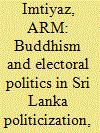

|
|
|
|
|
| Publication |
2014.
|
| Summary/Abstract |
Organized religions often play a significant role in the political affairs of any country when political actors carefully employ them to pursue power. Buddhism is the major religion on the island of Sri Lanka, and often it becomes a powerful symbol for Sinhala-Buddhist politicians. This study examines the interaction between Buddhism and politics in Sri Lanka, and will attempt to examine the religious factors in Sri Lanka's ethnic conflict between the two nations; namely, Tamil and Sinhala. It will examine how the politicization of Buddhism helped Sinhala political elites and leaders in their quest for power, reinforcing religious and ethnic tensions, and finally will discuss some solutions to de-religionize the state structure to help Sri Lanka enjoy the fruits of modernization and democracy.
|
|
|
|
|
|
|
|
|
|
|
|
|
|
|
|
| 3 |
ID:
156019


|
|
|
| 4 |
ID:
117047
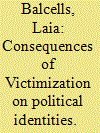

|
|
|
|
|
| Publication |
2012.
|
| Summary/Abstract |
This article explores the impact of war-related traumatic experiences on political identities and political behavior by exploring different pieces of empirical evidence from the Spanish Civil War (1936-39), the Franco dictatorship (1939-75), and its aftermath. On one hand, the author analyzes semistructured interviews of survivors of the civil war and the dictatorship; on the other hand, she assesses data from a specialized survey implemented on a representative sample of the Spanish population. The analyses broadly suggest that, controlling for family leanings during the civil war, victimization experiences during the civil war and the subsequent dictatorship lead to the rejection of the perpetrators' identities along the political cleavage that was salient during the war (i.e., left-right). The survey analysis also indicates that (1) although grudges related to severe wartime violations are transmitted through generations, moderate wartime violations do not have such a long-term political impact; (2) the political effects of victimization do not increase with proximity to the traumatic events (i.e., age); and (3) victimization experiences do not have a significant impact on identities along cleavages that were not salient during the war (i.e., center-periphery).
|
|
|
|
|
|
|
|
|
|
|
|
|
|
|
|
| 5 |
ID:
127776
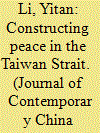

|
|
|
|
|
| Publication |
2014.
|
| Summary/Abstract |
Economic integration in the Taiwan Strait has become increasingly stronger recently. Economic integration should have led to stronger political convergence. Why hasn't it occurred? I argue that democracy in Taiwan and the continuation of the single-party rule in China have created two very different social experiences. These different social experiences have formed two different identities. People in Taiwan are increasingly thinking of themselves as Taiwanese rather than Chinese. The growing level of popular nationalism in China has also altered the political identity of mainland Chinese. Such change could force Beijing to accommodate citizens' demand to act more toughly towards Taipei. Further political integration is still possible, but it would require another norm change, perhaps already in the making.
|
|
|
|
|
|
|
|
|
|
|
|
|
|
|
|
| 6 |
ID:
132711
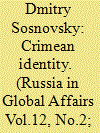

|
|
|
|
|
| Publication |
2014.
|
| Summary/Abstract |
Kiev's attempt to build an all-Ukrainian identity solely on the basis of the Ukrainian ethnos through political centralization, cultural unification, and forceful assimilation was a complete failure. Now, as part of the Russian Federation, which pursues an entirely different regional policy, Crimea has an opportunity to form its own regional identity.
|
|
|
|
|
|
|
|
|
|
|
|
|
|
|
|
| 7 |
ID:
106279
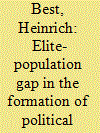

|
|
|
| 8 |
ID:
157530
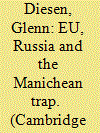

|
|
|
|
|
| Summary/Abstract |
Conceptualizing the EU as a postmodern cooperative power that “transcends realism” provides ideological scaffolding for an exclusive conception of “Europe” and veils a zero-sum geopolitical project as “European integration”. Neoclassical realism considers assigning morally opposite political identities to the EU and Russia to be “rational” to the extent it strengthens internal cohesion and mobilizes resources to enhance security in accordance with the balance of power logic. Yet, the artificial binary construction can also produce a Manichean Trap when compromises required to enhance security are depicted as a betrayal of indispensable virtues and “Europe”. The ability to harmonize competing security interests diminishes as the conceptual space for comparing the EU and Russia is de-constructed. Competition is framed in uncompromising terms as “European integration” versus Russian “spheres of influence” and democracy versus authoritarianism.
|
|
|
|
|
|
|
|
|
|
|
|
|
|
|
|
| 9 |
ID:
098192
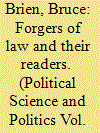

|
|
|
| 10 |
ID:
157399
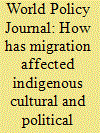

|
|
|
|
|
| Summary/Abstract |
Picture the American city. You can see it and so can I: gleaming post-industrial buildings, businesspeople in suits, working-class people toiling in service jobs, de-industrialization galore. Now, picture Native Americans. Not as illustrations in history books, but alive on reservations, maybe even leading protests, out of sight but somewhere in the American hinterland. These images don’t fit together very well. For many, they are juxtaposed: The former represents the pinnacle of progress, the latter the periphery and past. Yet according to the Census Bureau seven in 10 Native Americans, or 3.7 million people, live in cities. Even among the budding Indigenous intelligentsia, there is often a disconnect between our everyday realities and the way we place and tell our stories.
|
|
|
|
|
|
|
|
|
|
|
|
|
|
|
|
| 11 |
ID:
130385
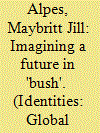

|
|
|
|
|
| Publication |
2014.
|
| Summary/Abstract |
This article addresses the migration aspirations of young, lower middle-class Cameroonians living in Anglophone Cameroon. Deportations and prevention campaigns portray the negatives of migration, yet often have little impact because they assume that migrants' aspirations are grounded in the prior success of other migrants. This research takes its lead from the question: Why aren't aspiring migrants in Cameroon discouraged by migration failure? It is based on an ethnographic fieldwork conducted between September 2007 and January 2009 in Buea (South West Cameroon). Since the late 1990s, the desire for a future 'away from home' has come to be expressed in Anglophone Cameroon by aspirations of going to 'bush'. Taking seriously people's conceptions of success and failure in places of departure, the article argues that locally voiced claims of 'global belonging' exert an important influence on migration aspirations. An understanding of deeply rooted migration desires must include an analysis of identity politics.
|
|
|
|
|
|
|
|
|
|
|
|
|
|
|
|
| 12 |
ID:
129472
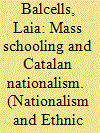

|
|
|
|
|
| Publication |
2013.
|
| Summary/Abstract |
In 1659, the kingdoms of France and Spain signed the Treaty of Pyrenees, a peace treaty by which a piece of the Spanish territory became part of France. Since then, Catalan identity has persisted on both sides of the border. However, while this identity is today politically and socially relevant in Spain, it is not in France. This article argues that this variation can be explained by the characteristics of the historical process of the spread of mass literacy in each of these countries. Catalan national identity is not salient
in French Catalonia because the first generation of mass literates became so under French rule. In contrast, the nonexistence of a scholastic revolution in Spain prior to the beginning of the 20th century allowed for the successful sowing of a Catalan national identity during the first decades of that century. The fact that mass literacy took place in Spanish Catalonia during a period of Catalan nationalist upheaval led to the endurance of this identity.
|
|
|
|
|
|
|
|
|
|
|
|
|
|
|
|
|
|
|
|
|